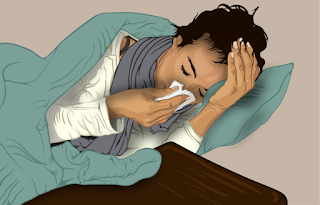Common cold
Fever, Sneezing, runny nose, sore throat, headache, body ache, fatigue and burning nasal membranes are the symptoms of common cold.
 |
| Image source: Creative Commons |
Causes of common cold:
Common cold is mostly caused by viruses. There are many
viruses that cause common cold in humans but the rhinoviruses are the major ones
out of them.
Common cold is transmitted by droplet infection. It can
spread from one person to another through air and close contact with the
infected person
Risk factors:
Age: children are more prone to contract cold infections
than the adults.
Close contact: persons who come in contact with a person
having common cold easily catches the infection through droplets in air.
Germs or viruses of cold adheres to hands and objects of the
infected person and when the same things are used by someone else, there are
chances of catching common cold.
Season: common cold is often seen in colder climate
Smoking: common cold may be seen more in smokers than
non-smokers.
Low immunity: persons with weak immune system are susceptible to common cold infections.
Signs and symptoms of common cold:
It takes few days to weeks to catch common cold. The
symptoms may run for week or less.
IT affects the nose and throat, head and body.
Symptoms of common cold are as such:
- Runny nose, inflamed nasal mucosa, redness of the nostrils, watery nasal discharge, post nasal secretion drop in the pharynx, watery to thick nasal secretions, loss of smell, taste,etc.
- Feverish feeling, or presence of fever, Chest discomfort, feeling of congestion, coughing, difficulty in breathing etc. may be seen.
- Watery eyes, headache, sinus pain, mental irritability, fatigue, weakness and body aches including general body pain.
See the doctor in case:
- The fever does not subside
- Presence of swollen and painful lymph nodes
- Difficulty in breathing, wheezing, shortness of breath
- Severe nasal blockage or congestion
- Ear pain or discharge
- Severe sinus pain
- Severe fatigue or weakness
Treatment:
§ Normally common cold requires no added medical
intervention. Rest, home remedies and use of nasal decongestant balms can
provide relief. The symptoms most often go away in a week to ten days. If the symptoms trouble the person more, he
must take over the counter medications. Oral decongestants can be prescribed in
severe cases.
Healthy tips/Home remedies COMMON COLD:
- Vaporizer balms prove to be helpful in providing relief from blocked nose.
- Having Ginger-Tulsi tea also relaxes the muscles of head and helps in treating the sore throat and cough. It also relieves headache.
- Using eucalyptus oil can relieve headache and relieve common cold
- Take steam inhalation. Add carom seeds or ajwain and camphor tablet to a jug or bowl of hot water. Now take deep breath inhaling strong vapours. Cover your head with a towel while taking inhalation.
- Rest adequately. Keep yourself warm. Warmth helps in providing considerate amount of relief during common cold.
- Avoid having chilled beverages. Take hot immunity-boosting beverages only. Have warm soups and semi-solid diet.
- Intake of plenty fluids.
- Keep yourself isolated from others to prevent spread of infection
- Use saline nasal drops. Use a clean humidifier or cool mist vaporizer to get quick relief.
- Salt water gargles help in relieving sore throat and sticky mucus.
Common cold is self-limited common ailment which lasts only for few days to a week. Seeking Ayurveda medicine can also prove to be useful as there are good results of the ayurvedic medications and which have no side-effects.

Comments